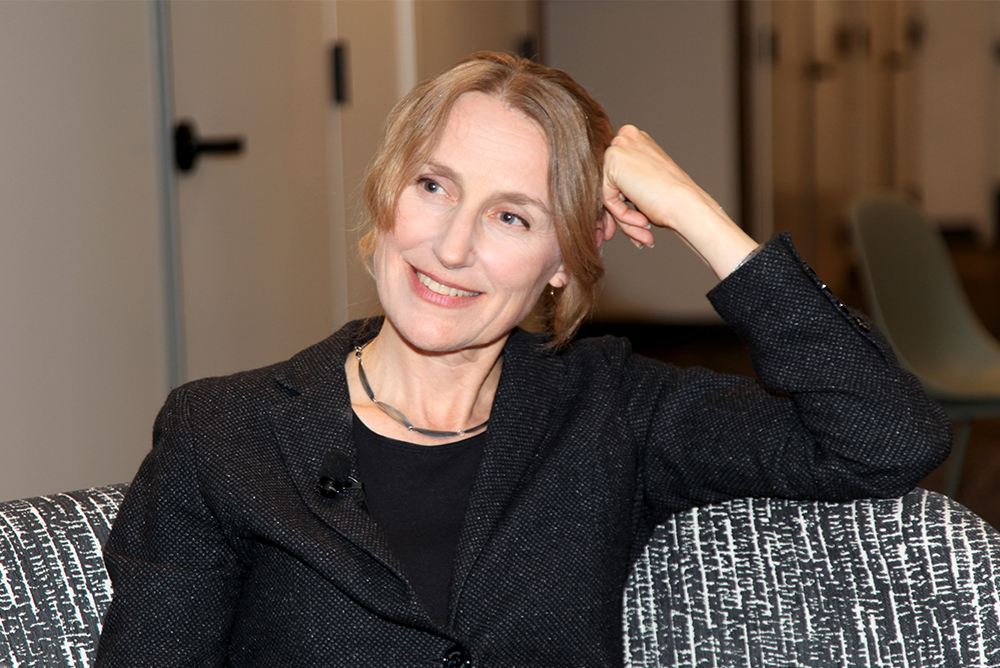
Photo by Aaron Salcido.
Michelle Wilde Anderson is a professor at Stanford Law School and the Stanford School of Sustainability. Her book, The Fight to Save the Town: Reimagining Discarded America, won the 13th annual Zócalo Book Prize. Before sitting down for the prize event, “How Does a Community Save Itself?,” she joined us in the green room to chat about Beyoncé’s world tour, relaxing with YA, and her local work in the San Francisco Bay Area.
You live in San Francisco. Where is one place you like to go in the city?
I love Fort Funston. Cliffs, wind; bring a sweatshirt and a hat. My dog is in paradise, my kid is in paradise. We try to get out on weekends and enjoy the gorgeous environment.
Zócalo is turning 20! What is some advice you wish you’d received in your 20s?
Drink more water. I had way too much caffeine across my 20s, and not enough water. Also: The relationships you build in your 20s—your friendships—are priceless. Those relationships take you through parenting for those who become parents; I really think that’s important. But above all, I am so grateful that through my 20s, I got on a path to do the work I love and not just work that paid my bills.
What was your most memorable birthday and why?
I remember a birthday when I was a little kid and my mom—who is not very giggly—became super hysterical and put two strawberries over her eyes, and it was totally adorable. It was a very memorable scene in my childhood.
You write about four places in your book. What is one of the best things you ate while in:
Detroit, Michigan: I barely remember the food at Baker’s Keyboard Lounge and Bert’s Jazz Bar, because really who cares about food when the music is that good? And does whiskey count as food? Because I’ve never enjoyed that so much as at Northern Lights Lounge on a Tuesday night when Dennis Coffey is on stage!
Lawrence, Massachusetts: I was embarrassed to go to Mi Cocina and other great Dominican spots in Lawrence because I’m a vegetarian, but they didn’t throw me out. So glad about that because the tostones and mofongo de queso were awesome. I also loved Bee Sting lattes at El Taller.
Stockton, California: I think I first tried fried jalapeños at Mi Ranchito—so good! I also loved the huevos rancheros at Nena’s downtown.
Josephine County, Oregon: I went to a dinner where everything was locally grown by people from the homestead in the rural areas. Even all the glassware was hand-blown by people. One woman had grown collard green leaves and she made hummus from homegrown garbanzos that she wrapped in the collard greens. That was memorable.
What is one thing you do to try and better your community?
I am really involved in a housing organization that works on the affordable housing crisis in strong cities like San Francisco. I also work closely with a legal aid organization in Oakland. I live very close to a big public housing development in San Francisco that is in transition, called Potrero Annex. It’s a big 1940s housing development. There are three of these big housing developments left in San Francisco, and they’re all in transition at the same time. So, I’m thinking a lot about how to get involved in that transition and actually support the residents remaining across the site. I’m interested in writing about it and helping the larger San Francisco public understand the history of it.
What do you do to recharge?
I get outside. And exercise. And pet my dog. And hang out with my kid.
How did you first get into law?
I was working at this incredible youth development program in the public housing developments of Connecticut. A lot of the people who ran that organization had come from the Civil Rights Movement and had themselves gone to law school. I idolized them. Through them, I saw a law degree not as a path to being a litigator but as a toolkit for doing social justice work. I went to law school because I wanted my career to end up like theirs.
You did your master’s in London. What is one of your fondest memories from that time?
I did my thesis project there on minority-run housing programs in Leeds, in northern England. It was deindustrializing kind of like New Haven was and going through some of the same challenges I had seen there. It was fascinating. And definitely imprinted on me, and has its fingerprints on this book.
You open your book with a prologue about the “Symphony for a Broken Orchestra.” How did that come about?
I usually take the train to work from San Francisco to Stanford. But I was driving one day and I put on NPR and a little spot about the Symphony for a Broken Orchestra came on and I literally almost got in an accident. It blew me away. It was one of those amazing moments where the metaphor for what I was writing and what the people I was writing about were doing just crystallized so perfectly.
What was one of the last great books you read?
The Deeper the Roots by Michael Tubbs, which I just finally read and was incredibly moving and beautifully written. I also read a lot of YA books to relax, so I’m going to get my hands on the new Shadowhunters book soon!
If you could only go to one, which would you choose: Taylor Swift’s Eras Tour or Beyoncé’s Renaissance World Tour?
Definitely Beyoncé. We are not Taylor Swift fans in my family. Beyoncé’s Lemonade is one of the great albums of all time. I’ve listened to it maybe a thousand times, so Renaissance Tour for sure!



